The landing of the British in Arkhangelsk. Formation of the Northern Front
Soviet power was evacuated from Arkhangelsk. The military government headed by captain Bers, commander of the Belomorsky cavalry regiment, came to power, which transferred its powers to civilian authorities headed by N. Tchaikovsky, the people's socialist, and formed the Northern Front under the general command of G. E. Chaplin.
prehistory
The key points in the north of Russia were the non-freezing port of Murmansk and the large port city of Arkhangelsk. The Murmansk Port and the Murmansk Railway were built at 1916 to supply Russia with military equipment and materials from the Entente countries. Through Arkhangelsk and Murmansk, the allies during the war years supplied Russia with military supplies. After February, the United States began to provide economic and technical support to the Provisional Government of Russia. Since the summer of 1917, however, military equipment that the Allies continued to deliver through Arkhangelsk and Murmansk began to accumulate in the warehouses of these ports. By the time Russia left the war with Germany, millions of tons of military cargo had accumulated in the ports of Murmansk and Arkhangelsk.
In early March 1918, the Bolsheviks signed a separate peace treaty with Germany. At that time, in Finland, which became independent, there was a civil war between white and red Finns, and German troops were sent to help the white Finns. In April, 1918, Germany landed troops in Finland, and there was a threat that the Germans would seize the railway Murmansk - Petrograd and strategic ports with a large number of military cargo and materials. London and Paris decided to intervene in the north of Russia with the aim of: 1) not to allow the Bolsheviks or Germans to seize the equipment supplied by the Entente in Arkhangelsk and Murmansk; 2) support the Czechoslovak Corps, which was dispersed along the Trans-Siberian Railway; 3) seize strategic points in the north of Russia and re-open the anti-German front in the East, overthrowing the Bolsheviks with the help of the Czechs and whites. England and France asked for help from US President Woodrow Wilson. In July 1918, Wilson agreed to participate in the intervention of a limited US contingent. American soldiers were part of the American Expeditionary Force in Northern Russia (“Polar Bear Expedition”).
At the same time, originally the Westerners were invited by the local Bolsheviks themselves to defend themselves against the White Finns and the Germans. 1 March 1918, the Murmansk Council (Chairman Aleksey Yuryev) informed the Council of People's Commissars (SNK) about the received proposal of British Rear Admiral Thomas Kemp about the protection of the forces of the British forces of the Murmansk Railway from the German and White-Finnish troops. Leon Trotsky, who was the people's commissar for foreign affairs (and an agent of the West within the Soviet government), replied that such a proposal should be accepted. Yuriev concluded the 2 March 1918 Agreement: “1. The highest authority within the Murmansk region belongs to the Murmansk Council of Deputies. 2. The high command of all the armed forces of the region belongs under the rule of the Sovdep of the Murmansk Military Council of 3 persons - one by appointment of the Soviet government and one each by the British and French. 3. The British and the French do not interfere in the internal management of the area: all decisions of the Council of Deputies of general importance, they are inquired by the Department in a form that, according to the circumstances of the case, will be deemed necessary. 4. Allies take care of supplying the region with the necessary reserves. ”
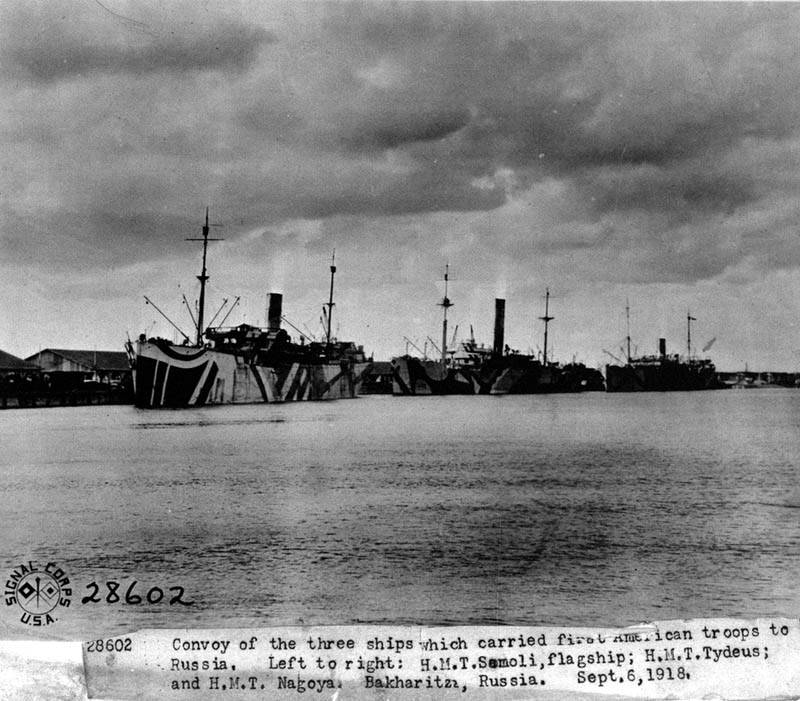
The beginning of the invasion
6 March 1918 in Murmansk from the ship "Glory" landed two detachments of British marines in the number of 176 people with two guns. The next day, the English cruiser Cochrane appeared on the Murmansk raid, the March 18, the French cruiser Admiral On, and the May 27, the American cruiser Olympia. 15 - 16 March March 1918 in London hosted a military conference of the Entente, at which the question of intervention was discussed. In the conditions of the beginning of the German offensive in France, it was decided not to send large forces to Russia. The Entente landing force did not undertake any actions, fulfilling its main task - the protection of military cargo in the port of Murmansk. In May, the British even helped Red to break up the Finns in the Pechenga area.
All the interventionist forces in the North were under British command, led first by General F. Pull (then by General E. Ironside). In June, 1,5, thousands of British and 100 American soldiers, landed in Murmansk. The German government, represented by its ambassador to Moscow, Count Mirbach, asked the Soviet government to take further actions regarding this act that violated the conditions of the Brest peace, and offered assistance for the elimination of the Entente landing force. Moscow rejected this offer. In August 1918 was already Chicherin asked for help from the German ambassador Helferich. He invited the Germans to defend Petrograd, while the red troops from the Petrograd district will be sent to protect the North. Germany was no longer up to this, on the French front the decisive battle, the last hope of the German high command, was just ending.
In the meantime, the Westerners inclined to treason the presidium of the Murmansk Council, promising in exchange for monetary assistance, the supply of food and industrial goods. And local authorities promised representatives of the Entente not to interfere with the organization of white troops and promoted the occupation of the region by the troops of the Entente. The British fleet during July slowly mastered the White Sea coast, landed troops in Soroca and occupied the Solovki islands. After that, the British began to prepare for the landing of troops in Arkhangelsk, while at the same time spreading their power to the south along the Murmansk railway. On June 23, all Allied embassies in Vologda withdrew and moved to Arkhangelsk.
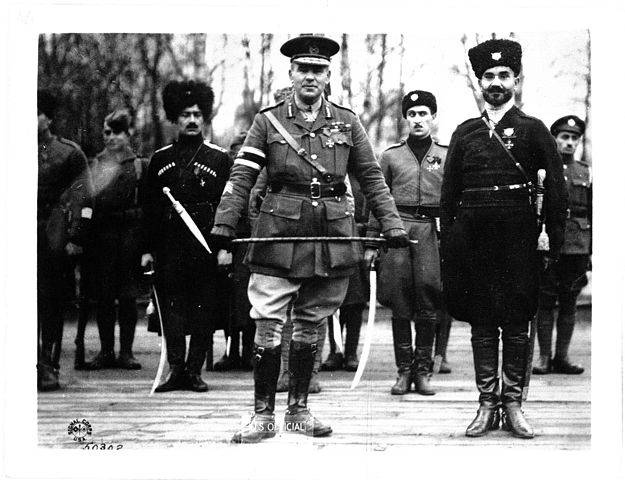
The commander of the Allied forces in the north of Russia, English General Frederick Cuthbert Poole
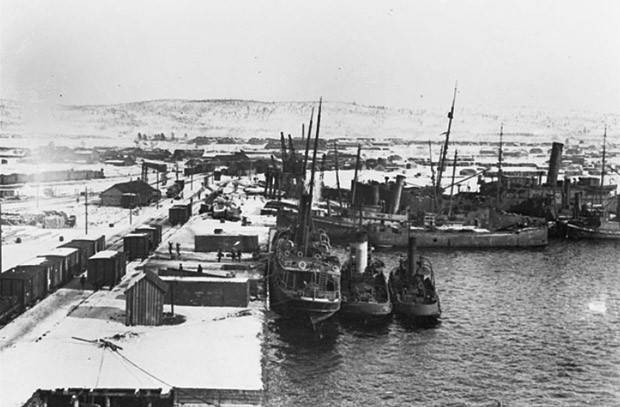
Entente countries ships in the port of Murmansk
In the same period, with the support of the British, the activation of various counter-revolutionary elements takes place. Even before the interventionists arrived, Arkhangelsk was overcrowded with representatives of all kinds of underground counter-revolutionary organizations and circles. Some came here on their own initiative, others were associated with the Anglo-French missions and drove in their direction. They were recruited into the troops and civilian institutions. The local conspirators were led by 2 rank captain Chaplin G. Chaplin, who had previously served in the Baltic Fleet. In the spring of 1918, he appealed to the representatives of Great Britain in Petrograd with a request for admission to the British military service and on the recommendation of the British naval agent Cromi was sent with documents of the British officer Captain Thomson to the North of Russia. Colonel Potapov, the commander of the Red forces, was also involved in the plot. The Belomorsky cavalry detachment, in which many officers from Petrograd were recruited, became the strike force of the conspirators.
The Red Command had insignificant forces in the Murmansk Territory and on the White Sea coast - about 4 thousand people. At the same time they were scattered over a huge space. In the strategically important Arkhangelsk garrison did not exceed 600 people. In addition, the central command did not take into account the importance of the North of Russia, it was considered as a secondary and, moreover, only a possible front. As a result, Moscow did not plan to strengthen its forces in the north, and it could especially strengthen this strategic direction with manpower, given the critical situation and the heavy fighting in the south and east of the country. Therefore, in conditions of the possibility of disembarking the enemy, evacuation of military equipment and ammunition along the Northern Dvina to Kotlas began. Unlike Murmansk, during the nine months of their power in Arkhangelsk, the Bolsheviks managed to transport almost all the reserves to Central Russia.
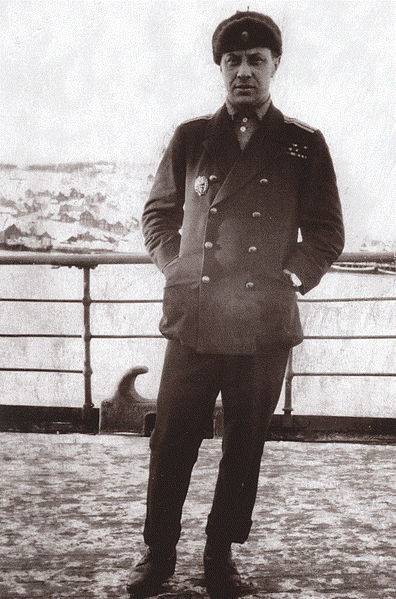
One of the leaders of the white movement in the north of Russia, captain Georgy Yermolaevich Chaplin (1886 - 1950)
Landing in Arkhangelsk. Formation of the Northern Front
2 August 1918, a British squadron of 17 warships approached Arkhangelsk. The coastal batteries of Mudyug Island near Arkhangelsk practically did not resist. A multi-thousand landing force was freely landed on the shore. The success of their disembarkation was facilitated by the successful anti-Soviet uprising in the city on the night of August 2, organized by the second-rank captain Georgy Chaplin and the hasty escape of the Reds from the city at the sight of the British squadron. The remaining Red Army soldiers did not resist and surrendered. By the end of 1918, the number of British troops in Arkhangelsk will reach 15 thousand people (while more than 10 thousand people settled in Murmansk), and soon the military contingents of other Entente countries — the American soldiers, Canadians and Australians — would join them. ), the French, Serbian and Polish arrows.
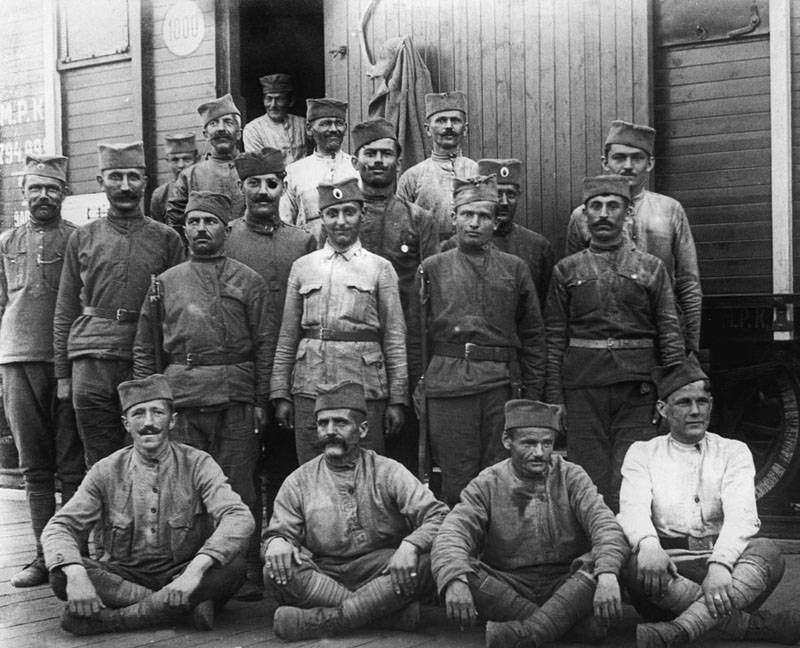
Serbian soldiers
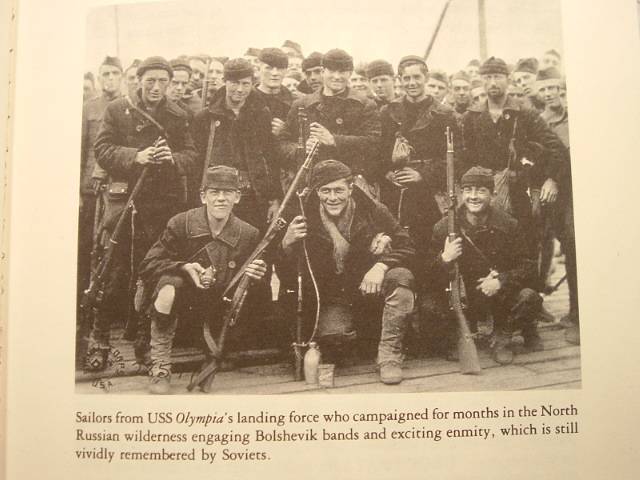
American sailors from the cruiser "Olympia"
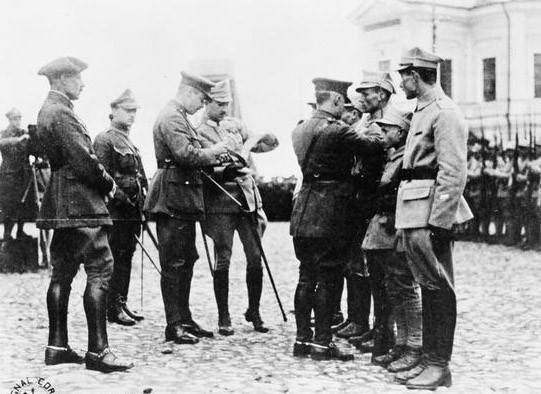
British officers award distinguished soldiers of the Polish battalion
On August 4, the Supreme Administration of the Northern Region (VUSO) was formed in Arkhangelsk, consisting of six Social Revolutionaries and two Cadets, chaired by People’s Socialist Nikolay Tchaikovsky. This government was one of the most democratic in the series of all that arose during the years of the Civil War. In particular, it announced the organization of local government in the Northern Region, the restoration of violated freedoms and organs of the Constituent Assembly, zemstvos and city councils, and the fight against hunger among the poor. All land (including formerly privately owned) was transferred to the zemstvos administration. The land acts adopted by the government of the Northern Region were a kind of symbiosis of the Cadet and Social Revolutionary agrarian programs.
The White forces initially consisted of officers volunteer teams, an infantry regiment formed in Arkhangelsk through mobilization, 2 artillery battalions and peasant groups totaling up to 3 thousand people. Chief was Chaplin. All units operatively obeyed the Allied command and were supplied by the British. Mixed units such as a Russian-French company or a Slavic-British legion were also created.
As in other regions of Russia where counterrevolutionary forces seized power, civilian and military authorities clashed. The socialist government (the Social Revolutionaries) tried to "deepen the gains of the revolution", was suspicious of representatives of the old administration and officers, suspected of being "counter-revolutionary." New authorities and troops were corrupted by “democratic” demagogy, order collapsed, a mess and anarchy arose (everything that had already happened in the period from February to October during the rule of the Provisional Government). The military part of the white movement in the North (right) also had a negative attitude towards the Supreme Government, composed of representatives of the socialist parties. On the night of September 6, 1918, Chaplin led a group of officers with the support of the provincial government commissioner N. A. Startsev, made a coup, removing the socialist ministers from power and exiled them to the Solovetsky monastery. Chaplin stood for the military dictatorship in the region, spoke very critically about the Constituent Assembly - the “Constituent Assembly”. In response, the Social Revolutionaries raised a peasant uprising, accusing the Rights of having wanted to restore the monarchy. As a result, under the pressure of the Entente, the power of the Supreme Administration was restored, but the cabinet was formed from a more moderate element (from the popular socialists and the Cadets). Chaplin was removed from command, in his place they put Colonel Durov, a former military agent in London. Later, Chaplin was returned from exile, and he headed the rifle regiment.
Pier in Arkhangelsk
The northern front had strong differences even against the background of the rest of Russia. There was no solid line of defense in the northeast and north directions. Natural conditions (tundra, swampy forests and swamps, harsh and snowy winter) in these areas determined the methods and forms of warfare, which were mainly conducted along the main transport communications - rivers and roads. The maneuvering of troops in impassable taiga and swamps was excluded. The terrain was generally wild, harsh, sparsely populated, and could not feed large masses of troops. That is, the struggle was conducted only in certain directions, which coincided either with the direction of the railway lines or rivers, which did not allow for the deployment of significant forces and the troops stopped for a long time, reaching the first strong defensive node. In addition, a harsh winter, long autumn and spring thaws generally stopped serious operations for a considerable time.
At the beginning of the campaign, the British command had the most serious forces surpassing the Red forces. At the same time, initially there were few whites; they were enough to form only small detachments. Therefore, the offensive was conducted by the interventionists. Westernizers could advance to two operational directions: one coincided with the railway line and went to Vologda, Yaroslavl and Moscow, that is, eventually led to the vital centers of Russia and areas convenient for the location and operation of significant troops; the other went to Kotlas, Vyatka, coinciding with Kotlas with Northern Dvina, and then with the railway Kotlas - Vyatka. This direction took place in a wild, inaccessible area and led to an area that had no political, military strategic, or industrial (economic) significance. However, in this direction, the Westerners could establish contact with the Czechs and the Whites, who acted on the Eastern Front, on the condition of a breakthrough to Perm and Vyatka.
And the strategic need for an offensive and a connection with the Czechoslovak Corps soon disappeared. After all, before there was an idea to recreate the Eastern Front from the Czechs and white against the Bolsheviks and Germans. But in August of 1918, it became clear that Germany lost the “Second Marne” - a decisive battle on the Western Front. Troops rolled to the unequivocal defeat of the German bloc. An expensive project to recreate the Eastern Front has lost its meaning. Therefore, the British went to the North not for the battle with the Reds, but for the occupation of the most important points of Russia, the realization of the strategic plans of the owners of the West. The other Russians, the whites, had to fight the Reds, ensuring the bleeding and exhaustion of the Russian civilization and people.
Thus, taking into account the fact that the command of the Entente was not going to enter the fight against the Red Army directly, but only to further inflame the fratricidal civil war, pitting the Russians against the Russians, the British chose the second direction and began to develop their efforts here. Here the Entente troops could receive the support of a powerful fleet. After the capture of Arkhangelsk, a fleet was formed for operations on the navigable rivers Severnaya Dvina and Vaga, consisting of 11 monitors, as well as minesweepers and gunboats captured in the city. He became the main force of the interventionists.
The advance of the allied forces along the Northern Dvina proceeded slowly and with great difficulty. Nature was harsh and inhospitable. At the same time, the hastily formed flotilla of the Red Army, which had no large ships, opposed the interventionists, gradually incapacitating one enemy ship after another. As a result, the advance of the Westerners proceeded extremely slowly and cautiously; neither the Allied Command, nor the soldiers wanted to bear serious battles and great losses in Russia. And during the entire autumn campaign of 1918, the interventionists advanced in the Murmansk region only just 40 km south of the town of Soroki, then the front passed through Chekuyevo on the r. Onega, Obozerskaya station, Sred - Mehrenga - Kodysh on the Elitsa river, Maly Bereznichek on the Vahe river, Topsa - Tulgas on Northern Dvina and through the Trufanov mountain on the r. Pinege.
Having missed the initial favorable balance of forces and the effect of surprise, and the possibility of rapid advance along the railroad in the south, the interventionists later met with stubborn resistance from the Red Army units (from the 6 Army), and operations on the Northern Front acquired only local significance, reducing to the struggle for individual road junctions and individual directions. The actions of separate roundabouts were widely spread. Having achieved their first successes, the Westerners stopped for a long time, and only in the middle of October did 1918 begin to show activity along the Arkhangelsk railway. At the same time, these offensive attempts were not widely developed due to the difficulties of the local climate and the increasing resistance of the Red forces.
Thus, the British command, having spent the month with the seizure of Arkhangelsk, was not in a hurry to make a breakthrough to the central regions and vital centers of Soviet Russia, starting movement in a secondary direction. The British acted slowly and passively, which allowed Moscow to strengthen its position in the north and avoid the threat of creating a united Northeast anti-Soviet front. The invaders did not use the strategic advantage in the North — the fleet, the numerical and qualitative superiority of the landing forces over the Red troops, losing precious time, which allowed the Red command to strengthen the direction of the troops and strengthened on the main points.
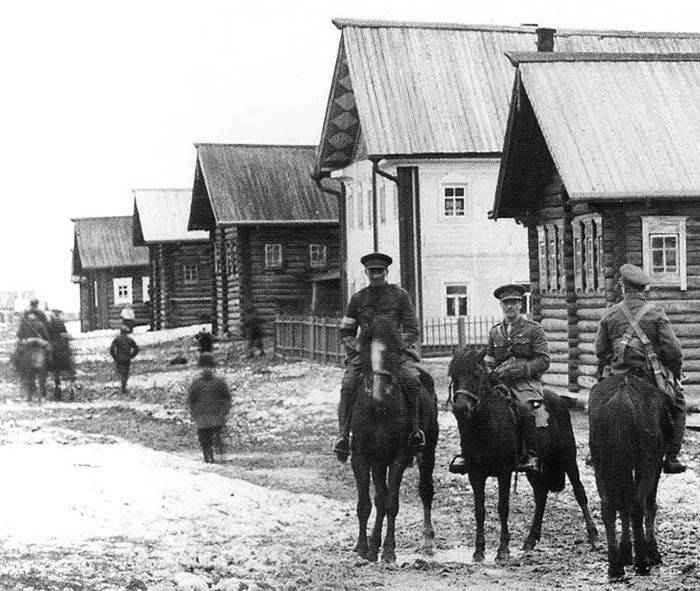
English signalers in Dvinsky Bereznik
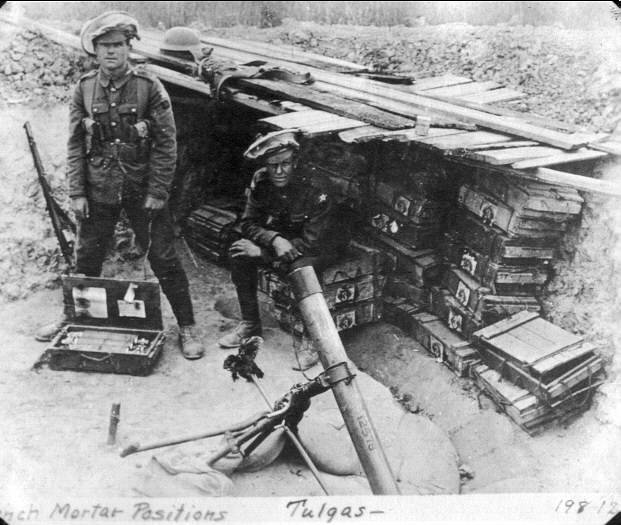
Americans fighting in the village of Tulgas. A small village on the banks of the Northern Dvina. The extreme point to which the Americans were able to advance in the fall of 1918 of the year, advancing on Kotlas. In November 1918, they were knocked out and retreated to Shenkursk
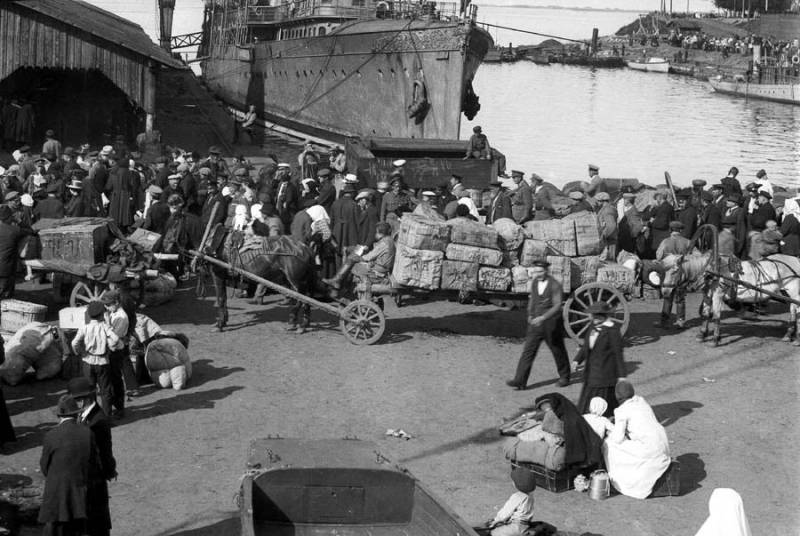
Information